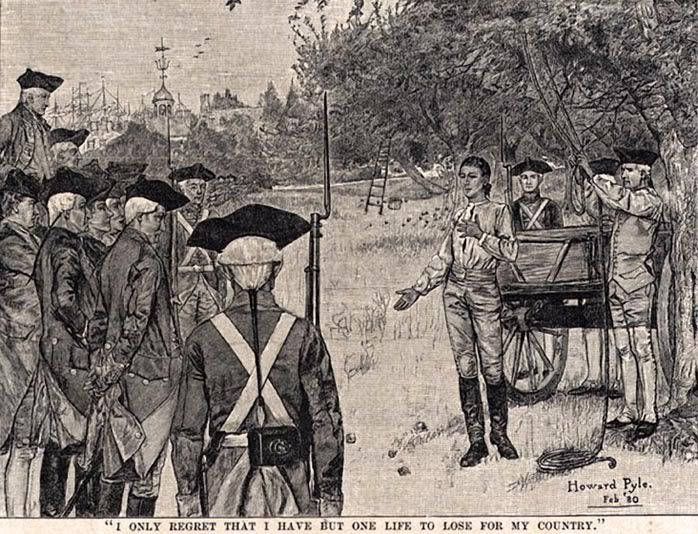Nathan Hale Died Here 2

The Execution of Nathan Hale, 1776
In the early summer of 1776, the British evacuated Boston leaving the city and New England to the rebelling colonialists. Where would the British strike next? The mystery was solved when a British naval force appeared off the coast of Staten Island in late June - New York would be their target. The city had great strategic value. Its deep harbor could shelter the British fleet and its capture would pave the way for the Red Coats to battle northward up the Hudson and link with a force moving south from Canada. This would separate New England from the rest of the colonies.
In late June, the British occupied Staten Island in a landing unopposed by the Colonials. In late August a combined force of British and Hessian troops crossed Lower New York Bay and invaded Long Island. The British attacked the Americans from two sides forcing the Colonials to cross over to Manhattan Island. In early September, General Washington retreated again, this time across the Harlem River leaving New York City to the British.
Nathan Hale was a lieutenant in the Continental Army. In his early twenties, Hale had worked as a schoolteacher before the Revolution. In late September 1776 he volunteered to cross the British lines and travel to Long Island in order to gather intelligence. Unfortunately, his mission was soon discovered and he was captured by the British. Taken to General Howe's headquarters (commander of the British forces) in New York, the young spy was interrogated and executed on September 22. Word of the execution was brought to General Washington's headquarters shortly after by a British officer carrying a flag of truce. Captain William Hull of the Continental Army was present and recalled the event:
"In a few days an officer came to our camp, under a flag of truce, and informed Hamilton, then a captain of artillery, but afterwards the aid of General Washington, that Captain Hale had been arrested within the British lines condemned as a spy, and executed that morning.
I learned the melancholy particulars from this officer, who was present at his execution and seemed touched by the circumstances attending it.
He said that Captain Hale had passed through their army, both of Long Island and York Island. That he had procured sketches of the fortifications, and made memoranda of their number and different positions. When apprehended, he was taken before Sir William Howe, and these papers, found concealed about his person, betrayed his intentions. He at once declared his name, rank in the American army, and his object in coming within the British lines.
Sir William Howe, without the form of a trial, gave orders for his execution the following morning. He was placed in the custody of the Provost Marshal, who was a refugee and hardened to human suffering and every softening sentiment of the heart. Captain Hale, alone, without sympathy or support, save that from above, on the near approach of death asked for a clergyman to attend him. It was refused. He then requested a Bible; that too was refused by his inhuman jailer.
'On the morning of his execution,' continued the officer, 'my station was near the fatal spot, and I requested the Provost Marshal to permit the prisoner to sit in my marquee, while he was making the necessary preparations. Captain Hale entered: he was calm, and bore himself with gentle dignity, in the consciousness of rectitude and high intentions. He asked for writing materials, which I furnished him: he wrote two letters, one to his mother and one to a brother officer.' He was shortly after summoned to the gallows. But a few persons were around him, yet his, characteristic dying words were remembered. He said, 'I only regret that I have but one life to lose for my country.'"



























No comments:
Post a Comment